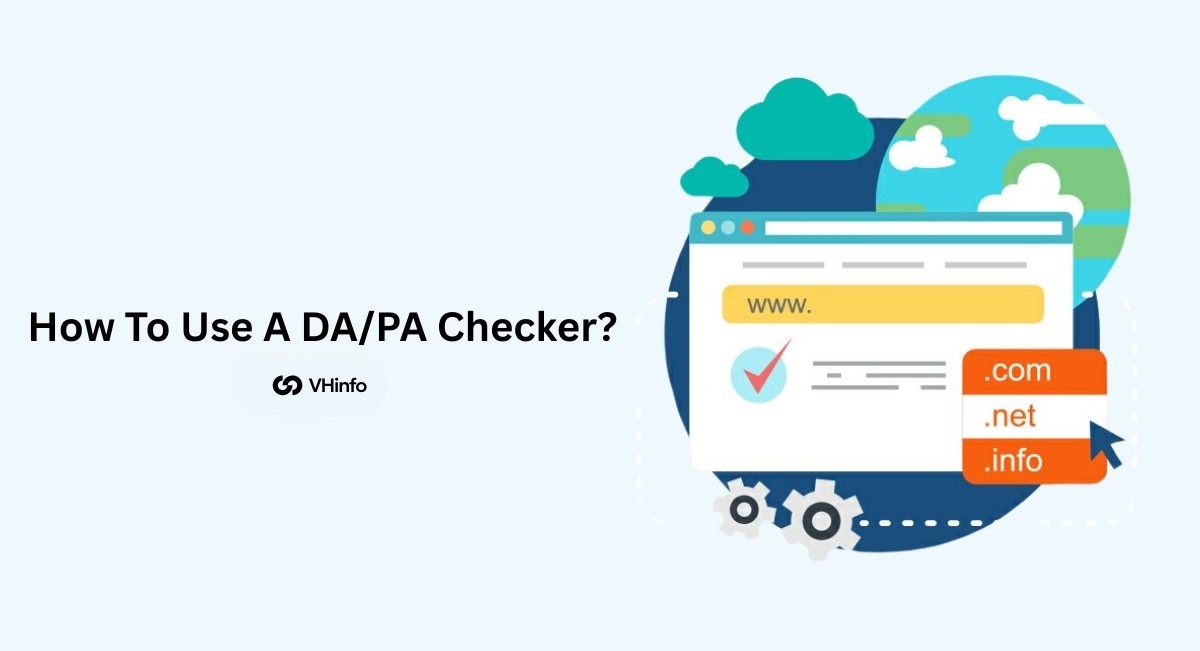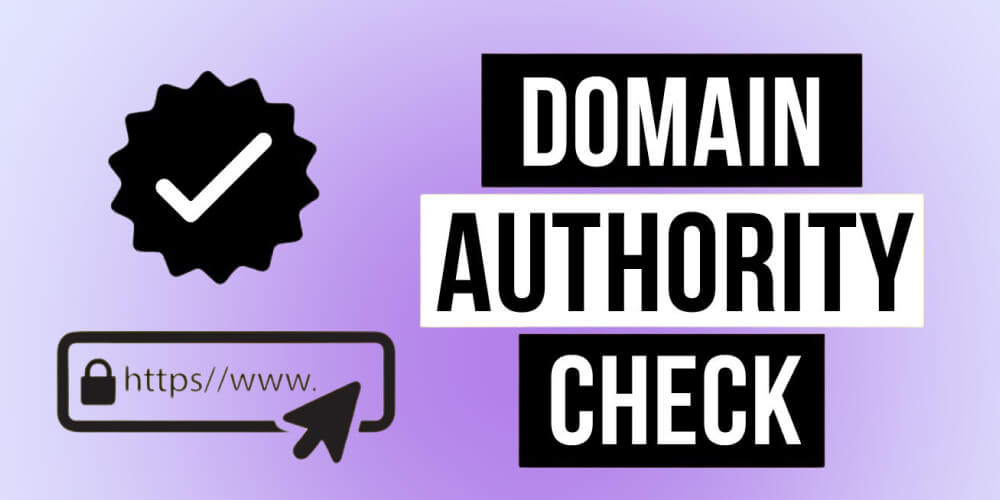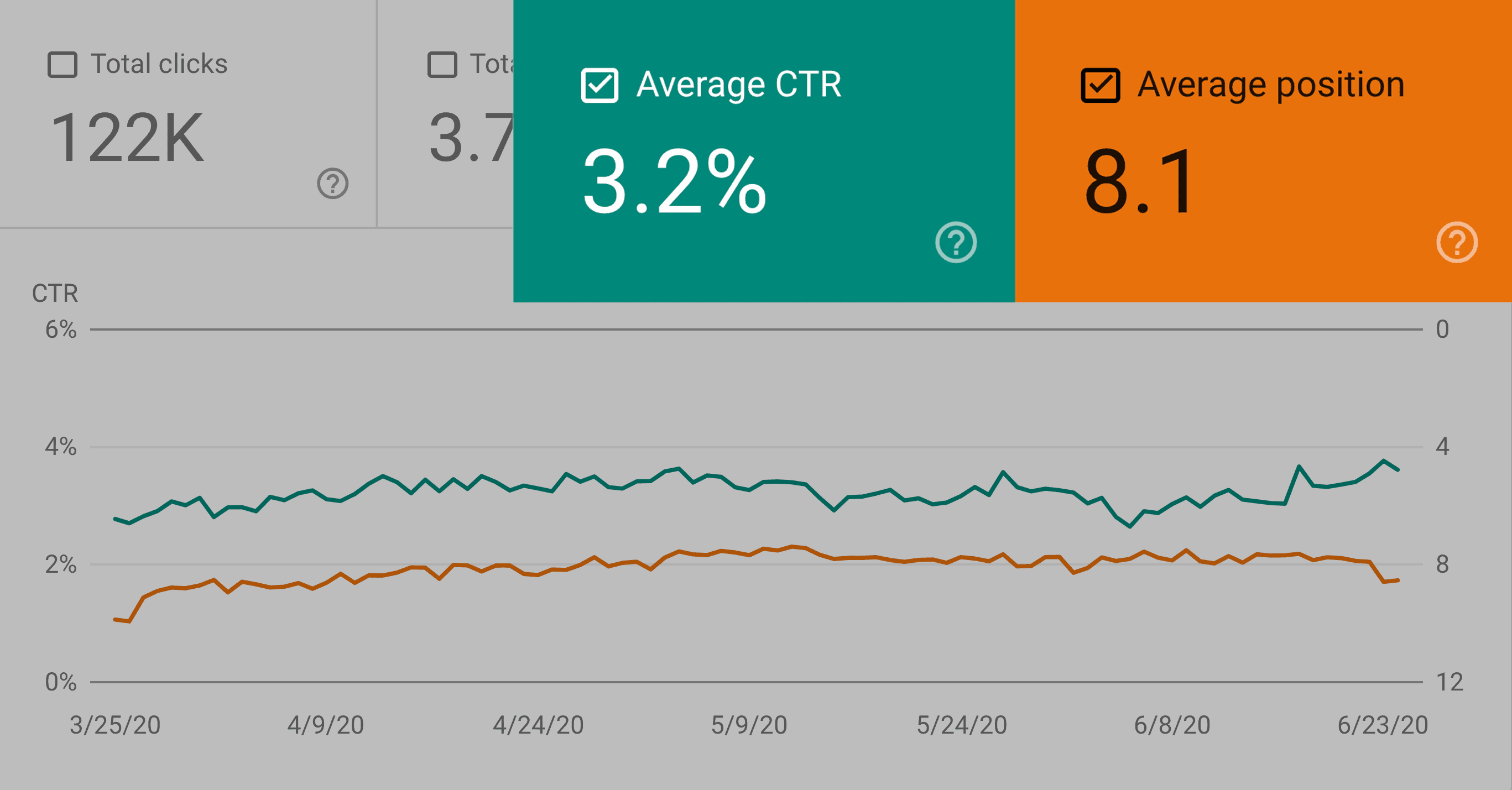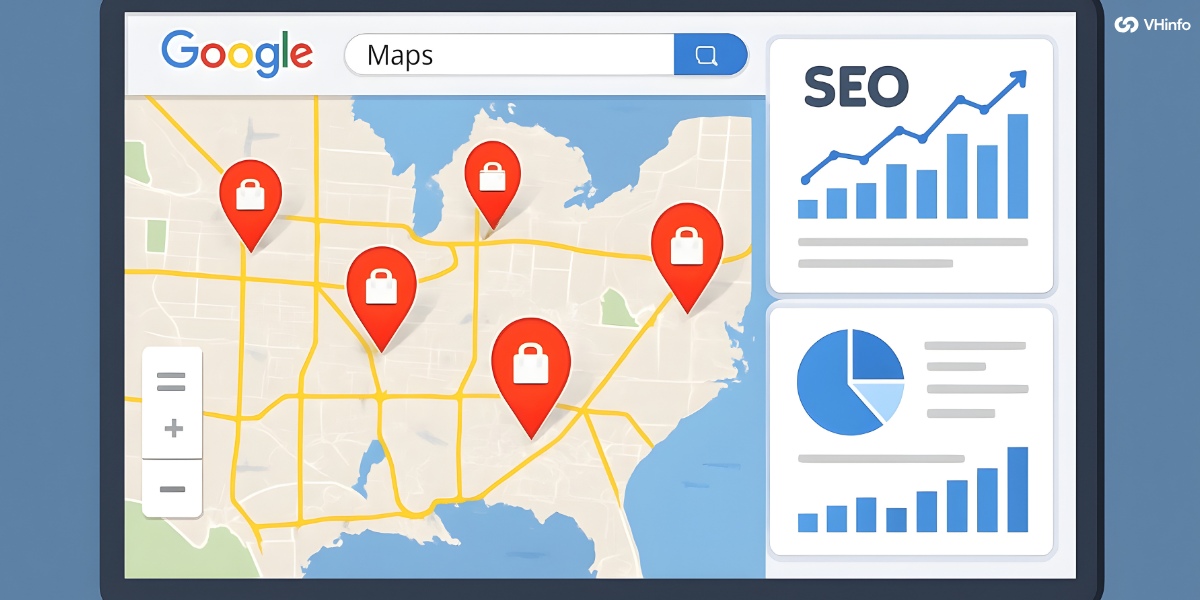When it comes to a successful SEO strategy, measuring and understanding your website’s authority is important.
Domain Authority (DA) and Page Authority (PA) are key metrics that predict how well your site may rank on search engine result pages (SERPs).
A free DA PA checker gives you the essential insights to make data-driven decisions and improve your website’s performance.
At VH Info, we understand that regularly monitoring these SEO metrics provides a significant competitive advantage. A higher domain authority score directly correlates with a better chance of ranking well in search results.
This guide will walk you through everything you need to know about DA PA checkers, from understanding the scores to using them to transform your SEO strategy.
What Is A DA/PA Checker?

A DA PA checker is a specialized online tool that measures the authority scores of both entire domains and individual web pages.
These tools, often available as a free bulk DA PA checker, analyze numerous factors, including backlink profiles, content quality, and site structure, to generate scores on a scale of 1 to 100.
The higher the score, the stronger the authority. These tools have become indispensable for SEO professionals and digital marketers who need to evaluate website authority quickly and accurately.
The best tools utilize machine learning algorithms and pull data from sources like the Moz API to ensure accuracy.
Why Use A DA/PA Checker?

Using a DA PA checker offers many benefits for your SEO strategy and provides a clear path for improvement.
- Assess Performance: It helps you gauge your website’s current authority, creating a baseline to track improvements over time.
- Competitive Analysis: By checking the domain authority of your competitors, you can identify industry benchmarks and set achievable goals.
- Link Building: Evaluate potential link-building opportunities by checking the authority of target domains.
- Monitor Growth: Track your website’s authority growth as you implement SEO tactics.
- Strategic Insights: Identify strengths and weaknesses in your SEO strategy to allocate resources more effectively.
What Are Domain Authority (DA) and Page Authority (PA)?

Before diving deeper into DA PA checker tools, let’s clarify what exactly these metrics measure and why they matter for your website’s performance on search engine result pages.
Domain Authority (DA) Explained

Domain Authority is a search engine ranking score developed by Moz that predicts how likely a website is to rank on search engine result pages. The score ranges from 1 to 100, with higher scores indicating a greater ability to rank.
Domain authority is calculated by evaluating multiple factors, including:
- Number of total links pointing to the domain
- Quality of those links (from reputable sites)
- The authority of linking root domains
- Domain age
- Website’s overall link profile
- Social signals
A domain authority checker tool measures this score, giving you insights into your website’s overall strength. New websites typically start with a low DA score (around 10-20) and gradually increase as they build quality backlinks and improve other SEO factors.
Page Authority (PA) Explained

While domain authority evaluates an entire website, page authority focuses on individual web pages. PA is also scored on a scale of 1 to 100, with higher numbers indicating a stronger likelihood of ranking in search results.
A PA checker tool analyzes factors specific to a particular URL, including:
- Quality of links pointing to that specific page
- Relevance of the content
- On-page SEO elements
- Internal linking structure
- User experience signals
Page authority score helps SEO professionals identify which specific pages on their site need improvement.
For example, key landing pages or product pages might require focused optimization to increase their PA score and improve their ranking potential.
DA Vs. PA: What’s The Difference?

While both metrics measure authority, they serve different purposes in your SEO analysis:
| Domain Authority (DA) | Page Authority (PA) |
|---|---|
| Measures entire domain’s strength | Measures individual page’s strength |
| Helps evaluate overall site performance | Helps optimize specific pages |
| Useful for competitive analysis | Useful for on-page optimization |
| Influenced by site-wide factors | Influenced by page-specific factors |
| Changes more slowly over time | Can change more rapidly with targeted optimization |
Both metrics work together to give you a comprehensive view of your website’s authority. While a high domain authority creates a strong foundation, individual pages may still need optimization to achieve their full ranking potential.
Beyond DA/PA: Other Important Metrics
The best checker tools provide a more complete picture of a site’s health by including other metrics:
- Spam Score (SS): Indicates the risk of a domain being penalized for spammy practices. A low score is better.
- Domain Rating (DR): An alternative authority metric from Ahrefs that also measures backlink strength.
- Trust Flow & Citation Flow: Metrics from Majestic that measure the quality and quantity of links, respectively.
- Total Backlinks (TB) and Quality Backlinks (QB): The total number of links versus the number of high-quality, “dofollow” links.
How To Use A DA/PA Checker?

Using a DA PA checker is straightforward, even for those new to SEO tools.
Here’s a simple process to check your website’s authority:
- Select a reliable DA PA checker tool (we’ll recommend some later)
- Enter the domain or specific URL you want to analyze
- Click the “Check Authority” button
- Review the results, which typically include:
- Domain Authority score
- Page Authority score
- Spam Score
- Number of backlinks
- Number of linking root domains
- Additional SEO metrics
For bulk analysis, many tools allow you to check multiple domains simultaneously.
This is particularly useful when:
- Analyzing competitors
- Evaluating potential link building partners
- Auditing multiple websites you manage
- Researching industry benchmarks
After receiving your results, compare your scores against competitors in your niche to establish realistic targets. Remember that DA and PA scores are relative metrics—what’s considered a “good” score varies by industry and competition level.
Key Features Of A DA/PA Checker Tool

Not all DA PA checker tools offer the same capabilities.
Here are the essential features to look for when selecting a tool for your SEO needs:
Quick and Easy To Use
A good DA PA checker provides results with minimal effort. The best tools require just a single click to generate comprehensive reports. Look for interfaces that are intuitive and don’t require extensive training to operate.
The tool should process your request quickly, delivering results within seconds. This efficiency is particularly important when checking multiple domains or conducting regular monitoring of your SEO metrics.
Accurate Results
Accuracy is paramount when measuring domain authority and page authority. Premium tools use Moz’s proprietary algorithm or similar reliable methodologies to calculate these scores.
The most trustworthy DA PA checker tools update their databases regularly to reflect the latest changes in search engine algorithms and website metrics. This ensures you’re making decisions based on current data rather than outdated information.
Bulk Checking and Comprehensive Analysis
Advanced DA PA checker tools allow you to analyze multiple domains simultaneously. This bulk DA PA checker functionality saves considerable time when conducting competitive research or evaluating numerous potential link building partners.
Beyond just providing basic DA and PA scores, comprehensive tools offer additional insights such as:
- Backlink profiles
- Referring domains analysis
- Spam score evaluation
- Historical data for tracking changes over time
- Competitor comparisons
Additional Metrics
While DA and PA are valuable metrics, the best checker tools provide additional SEO metrics to give you a more complete picture of website performance:
- Spam Score: Indicates potential red flags that might affect ranking
- Domain Rating: An alternative authority metric from Ahrefs
- Trust Flow: Measures the quality of links pointing to your site
- Citation Flow: Measures the quantity of links
- Domain Age: This shows how long a domain has been active
- IP Address information
- Social media metrics
These supplementary data points help create a more nuanced view of a website’s authority and potential.
Downloadable Reports
The ability to download and share reports is important for SEO professionals and digital marketers.
Look for tools that allow you to:
- Export data in CSV or Excel format
- Generate detailed reports with visualizations
- Schedule regular reports
- Share results with team members or clients
A downloadable Excel report makes it easier to track changes over time and integrate DA/PA data with other SEO metrics you’re monitoring.
Free Access
While premium tools often provide more comprehensive features, many quality DA PA checker tools offer free access with reasonable limitations.
Free DA PA checker options are ideal for:
- Small businesses with limited SEO budgets
- Beginners learning about authority metrics
- Quick checks without needing extensive analysis
- Basic competitive research
Even free tools should provide accurate results and a user-friendly interface.
However, expect limits on the number of queries or reduced access to advanced features compared to paid versions.
Tools For Checking DA and PA Scores

Several reliable tools are available for checking domain authority and page authority.
Here are some of the most popular options:
Moz’s Tools
As the creator of the Domain Authority and Page Authority metrics, Moz offers the most authoritative tools for checking these scores:
- Moz Link Explorer: The official tool for checking DA and PA, providing comprehensive analysis of domains and pages. It offers limited free searches with more extensive capabilities in the paid version.
- MozBar: A browser extension that displays DA, PA, and other SEO metrics as you browse the web. This is particularly useful for quick checks while researching competitors or potential link partners.
- Moz API: For developers and enterprises, Moz provides API access to integrate DA/PA checking into custom applications and workflows.
The Moz DA checker utilizes the company’s premium API to deliver the most accurate authority scores available. Their tools are regularly updated to reflect changes in search engine algorithms and web trends.
Other SEO Platforms
Several alternative platforms offer DA/PA checking capabilities:
- SEMrush: While primarily known for keyword research, SEMrush includes authority metrics in its domain analytics tools.
- Ahrefs: Offers its own Domain Rating (DR) metric alongside Moz’s DA measurements for comprehensive authority analysis.
- Ubersuggest: Neil Patel’s tool provides free DA/PA checking with attractive visualizations and trend data.
- Small SEO Tools: A simple free DA checker tool suitable for basic checks and analysis.
How Does The Domain Authority Checker Tool Help To Improve SEO?

A domain authority checker tool serves as a compass for your SEO efforts, pointing you in the right direction for improvements.
Here’s how these tools can enhance your SEO strategy:
- Competitive Benchmarking: By analyzing competitors with higher domain authority scores, you can identify gaps in your SEO approach and set realistic targets for improvement.
- Link Building Prioritization: Identifying websites with higher domain authority helps you focus your outreach efforts on obtaining quality backlinks from reputable sites.
- Progress Tracking: Regular checks allow you to monitor how your SEO efforts are impacting your authority scores over time.
- Problem Identification: Sudden drops in domain authority might indicate issues like lost backlinks, technical problems, or potential penalties that need addressing.
- Resource Allocation: Understanding which aspects of your site need the most improvement helps you allocate your SEO budget and efforts more effectively.
- Client Reporting: For agencies, showing improvements in authority scores provides tangible evidence of SEO progress to clients.
The domain authority score serves as a valuable predictive metric, helping you estimate how changes to your website might impact search engine rankings before those changes affect your actual position on Google search engine results.
Strategies To Improve Your Website’s DA and PA

Improving your domain authority and page authority requires a strategic approach focused on quality rather than quick fixes.
Here are effective strategies to boost these important SEO metrics:
Building High-Quality Backlinks
The foundation of strong domain authority is a robust backlink profile from reputable sites.
Focus on these link building tactics:
- Target High Authority Domains: Prioritize earning links from websites with higher domain authority than yours. These quality backlinks carry more weight in boosting your own authority.
- Diversify Link Sources: Acquire backlinks from various domains rather than multiple links from the same website. The number of unique root domains linking to your site significantly impacts domain authority.
- Create Link-Worthy Content: Develop comprehensive resources, original research, and valuable tools that naturally attract links from other websites in your industry.
- Guest Posting: Contribute content to established websites in your niche to earn quality backlinks. Look for sites with a high domain authority score and a relevant audience.
- Fix Broken Links: Use tools to identify broken links on reputable sites and suggest your content as a replacement, a technique known as broken link building.
- Monitor Competitors’ Backlinks: Analyze competitors with higher domain authority to identify their backlink sources and target similar opportunities.
- Remove Toxic Links: Use a spam score checker to identify potentially harmful backlinks and disavow them to protect your domain authority.
Enhancing On-Page SEO
While backlinks are important, on-page factors also contribute to both domain and page authority:
- Create Quality Content: Develop comprehensive, accurate, and valuable content that thoroughly addresses user needs. Content quality directly affects user engagement metrics that influence authority.
- Optimize Site Structure: Implement a logical site hierarchy with effective internal linking to help distribute page authority throughout your website.
- Improve Technical SEO: Ensure your site loads quickly, works properly on mobile devices, and has no crawling or indexing issues that could hinder search engine evaluation.
- Enhance User Experience: Reduce bounce rates and increase time on site by improving navigation, readability, and overall user experience. These user signals indirectly affect authority measurements.
- Implement Schema Markup: Add structured data to help search engines better understand your content, potentially improving how your pages are evaluated.
- Optimize For Search Intent: Align your content with what users are searching for to improve relevance signals that contribute to authority.
- Build Social Signals: While not a direct ranking factor, social media engagement can increase visibility and indirectly lead to more backlinks, boosting domain authority.
How To Improve Position On Google Search Engine?

While DA and PA are valuable predictive metrics, they’re part of a larger strategy to improve your website’s position on Google search engine results. Here’s a comprehensive approach:
- Keyword Research and Optimization: Identify relevant keywords with good search volume and moderate competition. Integrate these naturally into your content, titles, headings, and meta descriptions.
- Content Strategy: Develop a content plan that addresses user needs at every stage of the buyer’s journey. Create in-depth content that provides more value than competing pages.
- Technical Optimization: Ensure your website is technically sound with fast loading speeds, mobile responsiveness, secure connections (HTTPS), and proper indexing.
- User Experience Enhancement: Improve site navigation, readability, and accessibility to reduce bounce rates and increase engagement metrics that influence rankings.
- Local SEO: For businesses serving specific geographic areas, optimize Google Business Profile and build local citations to improve visibility in local search results.
- Authority Building: Use your DA PA checker to monitor improvements as you implement link building strategies to increase your website authority.
- Regular Auditing: Conduct periodic SEO audits to identify and fix issues that might be holding back your ranking potential.
- Competitor Analysis: Study websites that rank above yours for target keywords to identify opportunities for improvement.
- Featured Snippet Optimization: Structure content to potentially appear in featured snippets at the top of search results.
- Click-Through Rate Optimization: Improve your titles and meta descriptions to increase click-through rates from search results pages.
FAQ’s:
What Is The Difference Between DA and PA?
Domain Authority (DA) measures the predictive ranking strength of entire domains or subdomains, while Page Authority (PA) measures the strength of individual pages. DA evaluates the overall link profile and authority of your entire website, whereas PA focuses on the ranking potential of a specific web page.
What Is A Good DA Score?
A good DA score varies by industry and competition level. Generally:
- 1-20: New or small websites
- 21-40: Established sites with growing authority
- 41-60: Strong websites with solid authority
- 61-80: Very authoritative industry leaders
- 81-100: Top websites with exceptional authority (like major media outlets)
Rather than targeting an arbitrary number, aim to have a higher domain authority score than your direct competitors. Use a DA checker tool to benchmark against similar sites in your niche.
How Often Are DA/PA Scores Updated?
Moz typically updates its DA/PA scores approximately once per month.
However, this can vary based on algorithm changes and data refreshes. Most DA PA checker tools that use Moz’s API will reflect these updates shortly after they occur. Some third-party tools may update less frequently.
How Often Should I Check My Website’s DA/PA?
For most websites, checking DA/PA scores once a month is sufficient to track progress. This aligns with Moz’s update schedule and gives enough time for SEO changes to have a measurable impact.
For websites actively engaged in intensive link building or recovering from penalties, more frequent checks (every two weeks) might be warranted.
Do DA and PA Scores Directly Impact Google Rankings?
No, DA and PA are third-party metrics created by Moz, not official Google ranking factors. Google doesn’t use these specific scores in its algorithm.
However, DA and PA are designed to correlate with ranking potential because they measure many of the same factors Google considers important, such as link quality and quantity.
Can Improving DA/PA Directly Affect My Site’s Ranking?
While improving DA/PA doesn’t directly change your Google rankings, the actions you take to increase these scores (building quality backlinks, improving content, enhancing site structure) are the same actions that typically lead to better search engine rankings.
Think of DA/PA as indicators rather than drivers of SEO success.
Conclusion
Domain Authority and Page Authority have become essential metrics for SEO professionals and website owners looking to improve their search engine visibility. A reliable DA/PA checker tool provides valuable insights into your website’s strength compared to competitors and helps track progress over time.
Remember that these scores aren’t ends in themselves but rather indicators of your website’s ability to rank in search results. Focus on the fundamentals: creating quality content, building relevant backlinks from reputable sites, and enhancing user experience.
Regular monitoring with a DA PA checker allows you to measure the impact of your SEO efforts and make data-driven decisions.
Whether you’re just starting out or looking to boost an established site, understanding and improving your domain authority and page authority should be key components of your SEO strategy.
At VH Info, we believe in empowering website owners with the tools and knowledge needed to succeed in search engine optimization.



